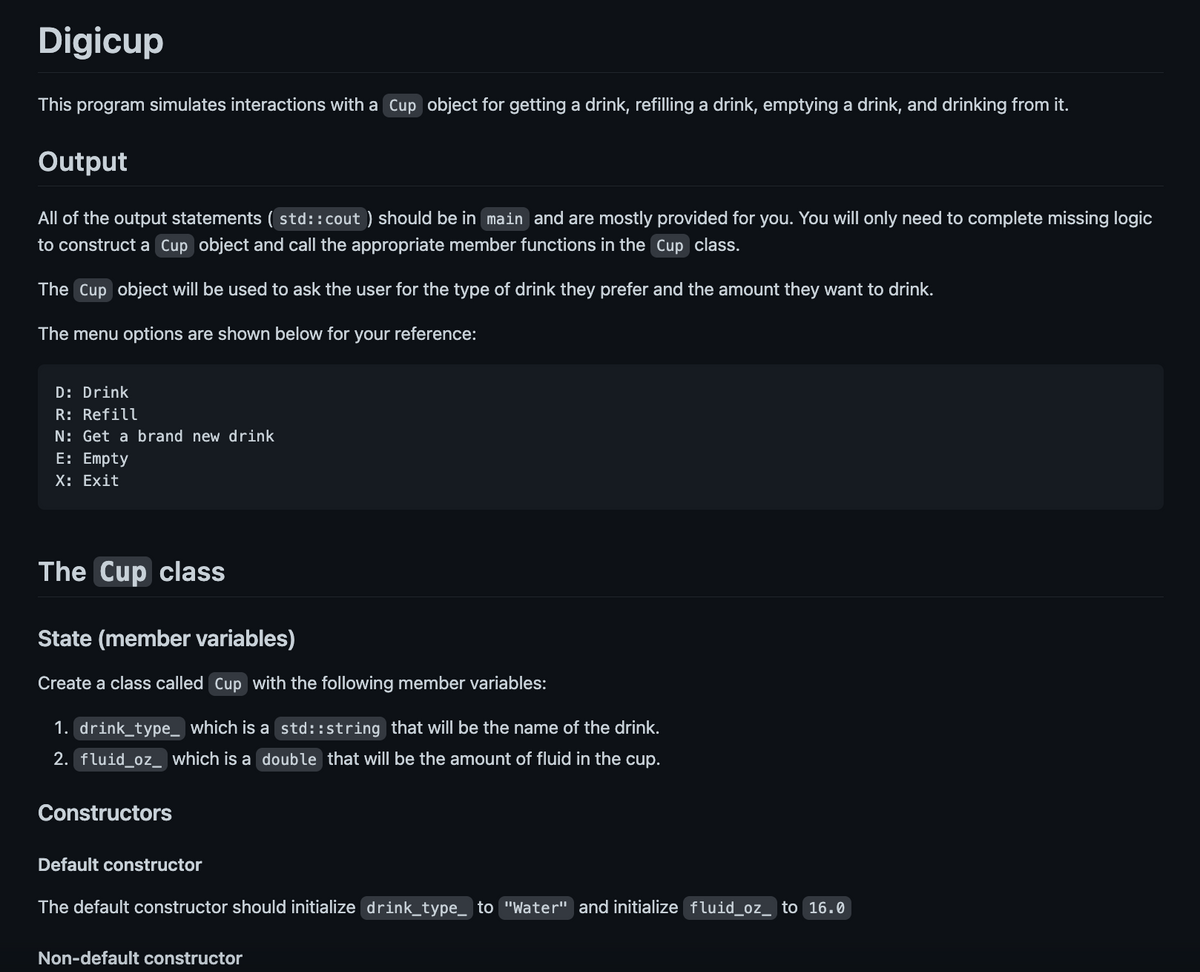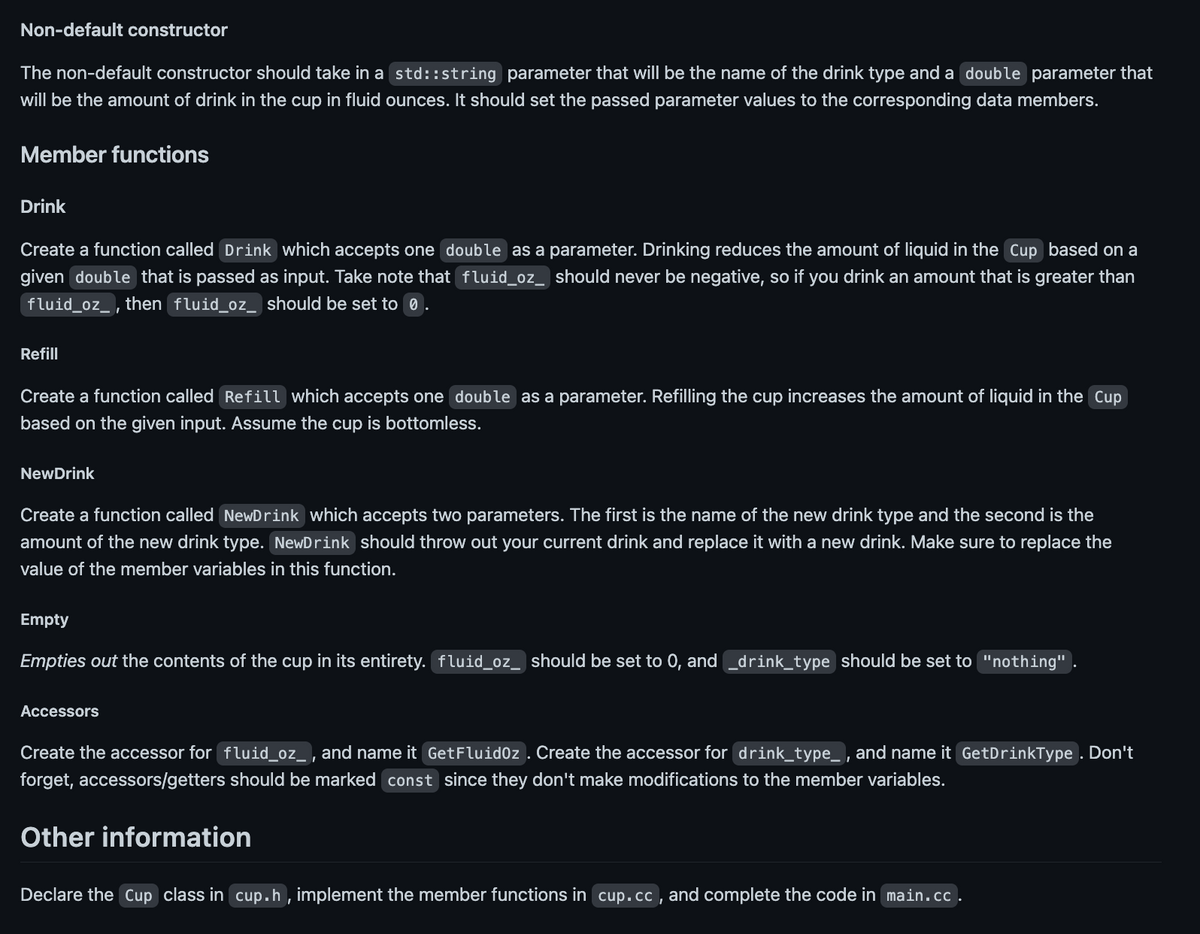main.cc file
main.cc file
#include <iomanip>
#include <iostream>
#include <string>
#include "cup.h"
int main() {
std::string drink_name;
double amount = 0.0;
std::cout << "What kind of drink can I get you?: ";
std::getline(std::cin, drink_name);
while (std::cout << "How much do you want to fill?: " &&
!(std::cin >> amount)) {
// If the input is invalid, clear it, and ask again
std::cin.clear();
std::cin.ignore();
std::cout << "Invalid input; please re-enter.\n";
}
//================== YOUR CODE HERE ==================
// Instantiate a `Cup` object named `mug`, with
// the drink_name and amount given by the user above.
//====================================================
while (true) {
char menu_input = 'X';
std::cout << "\n=== Your cup currently has " << mug.GetFluidOz()
<< " oz. of " << mug.GetDrinkType() << " === \n\n";
std::cout << "Please select what you want to do with your drink/cup?:\n";
std::cout << "D: Drink\n";
std::cout << "R: Refill\n";
std::cout << "N: Get a brand new drink\n";
std::cout << "E: Empty\n";
std::cout << "X: Exit\n";
std::cout << "Selection: ";
std::cin >> menu_input;
std::cin.ignore();
if (menu_input == 'X' || menu_input == 'x') {
std::cout << "Thank you for using our cup!\n";
break;
}
if (menu_input == 'D' || menu_input == 'd') {
std::cout << "How much do you want to drink from the cup?: ";
std::cin >> amount;
std::cin.ignore();
//================== YOUR CODE HERE ==================
// Call the `Drink` function here.
//====================================================
} else if (menu_input == 'R' || menu_input == 'r') {
std::cout << "How much do you want to refill your cup?: ";
std::cin >> amount;
std::cin.ignore();
//================== YOUR CODE HERE ==================
// Call the `Refill` function here.
//====================================================
} else if (menu_input == 'N' || menu_input == 'n') {
std::cout << "What is the new drink you want?: ";
std::getline(std::cin, drink_name);
std::cout << "What is the amount you want?: ";
std::cin >> amount;
std::cin.ignore();
//================== YOUR CODE HERE ==================
// Call the `NewDrink` function here.
//====================================================
} else if (menu_input == 'E' || menu_input == 'e') {
std::cout << "Emptying your cup\n";
//================== YOUR CODE HERE ==================
// Call the `Empty` function here.
//====================================================
} else {
std::cout << "Invalid use of a cup!\n";
}
}
return 0;
}
cup.cc file
#include "cup.h"
#include <iostream>
//========================== YOUR CODE HERE ==========================
// Implement the member functions for the Cup class in this
// file.
//
// Remember to specify the name of the class with :: in this format:
// <return type> MyClassName::MyFunction() {
// ...
// }
// to tell the compiler that each function belongs to the Cup class.
//====================================================================
cup.h file
#include <iostream>
//====================== YOUR CODE HERE ======================
// Declare the Cup class in this file, with the member
// variables and member functions as described in the README.
//============================================================
class Cup {
public:
//================== YOUR CODE HERE ==================
// Add the member function declarations here.
//====================================================
private:
//================== YOUR CODE HERE ==================
// Add the member variable declarations here.
//====================================================
};
Sample output picture provided with this link
https://imgur.com/a/DtAQurD


Trending now
This is a popular solution!
Step by step
Solved in 4 steps with 4 images




